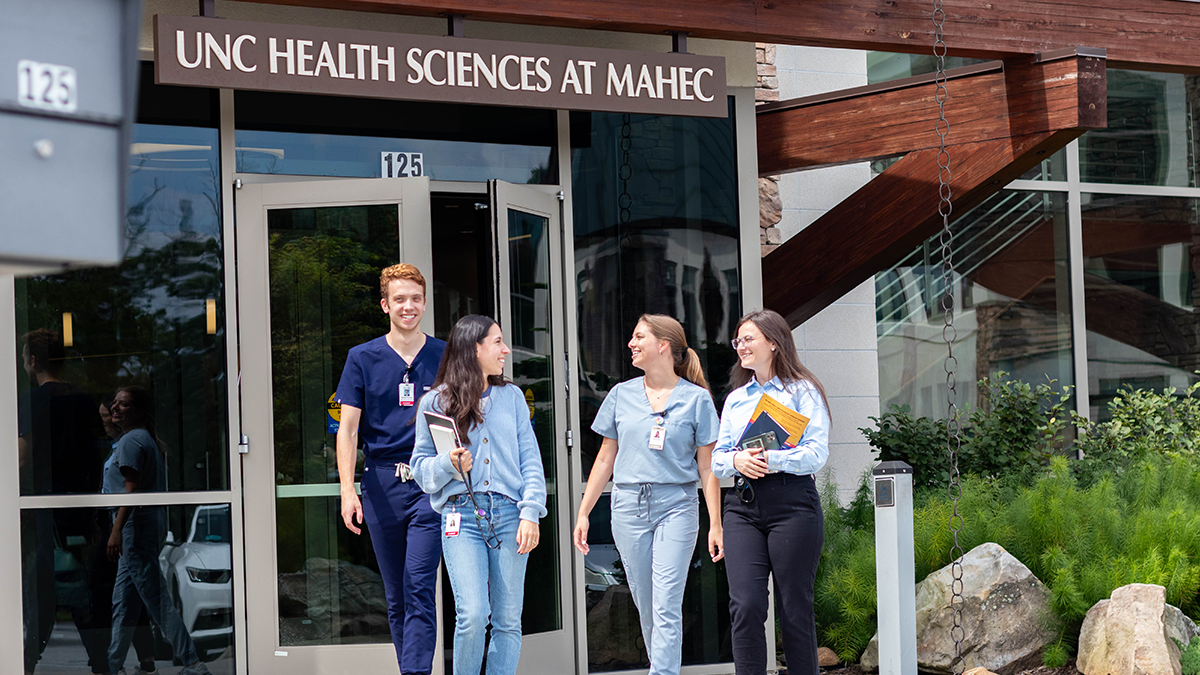Medical school uses innovative approach in Asheville
This collaboration with Mission Health and Mountain Area Health Education Center builds close-knit relationships over time.

The UNC School of Medicine’s work spans the entire state. In the mountains, an innovative educational approach and tight-knit community is helping its Asheville campus provide primary care services for rural North Carolinians.
Providing education to third- and fourth-year medical students, the UNC School of Medicine Asheville campus is a collaboration between UNC-Chapel Hill, Mission Health and the Mountain Area Health Education Center. MAHEC is home to UNC Health Sciences at MAHEC. In addition to the School of Medicine, the campus includes branches of the UNC Adams School of Dentistry, UNC Gillings School of Public Health and UNC Eshelman School of Pharmacy.
What began in 2009 as a campus with four School of Medicine students and 280 employees has boomed to 35 students and more than 1,000 employees. Residency programs have also allowed the campus to increase its capacity for teaching services in recent years.
The still relatively small campus has provided opportunities to educate students in a unique way and provide care for patients in all health care settings.
“We are still able give students individualized attention,” said Sandra Whitlock, associate dean and program director. “And on top of this, the students form strong connections with their peer group. These might be connections that they didn’t already have coming out of their pre-clinical years in Chapel Hill.”
What makes Asheville’s campus stand out is its “longitudinal curriculum.” Much like Harvard University’s “Cambridge model,” this form of education allows students to develop stronger relationships with preceptors while also allowing them to work with the same patients over time. This curriculum is meant to instill a broader sense of community among the patients and preceptors.
With MAHEC’s goal to provide care for rural communities, the curriculum keeps them in communication with experienced practicing physicians in the Asheville area, as well as seeing how a single patient’s well-being evolves or devolves over time. Students can learn different tools in real time as opposed to being exclusively focused on a different discipline one at a time.
Jeff Heck, the founding associate dean, devised the unique curriculum.
“Medical schools’ clinical curriculum was based on teaching the students specific disciplines in blocks,” Heck said. “The great disadvantage of this is that students begin to think medicine is just specialized. I was looking for alternatives, which led me to the longitudinal curriculum.”
Whitlock said she remembered “not really feeling connected to anybody” as a medical student. “I think what Dr. Heck initiated with the curriculum really helps with feeling like you have a consistent dialogue with patients and preceptors.”
Travis Williams, former Kenan scholar and Asheville campus student, is coming full circle thanks to that curriculum. He’s preparing to teach in the program as a preceptor for MAHEC.
“When I was a medical student, the program was really only just starting to blossom,” Williams said. “Many of the same people still remain that were so instrumental in my learning, which is a testament to their belief in the product that MAHEC puts out and the willingness to continue that ideal.”
With Carolina’s goal to have the nation’s leading public school of medicine, the work of a branch campus like Asheville is invaluable to broadening the mind of healthcare professionals and further emboldens Carolina’s commitment to collaboration.
“The collaboration with Chapel Hill is amazing,” Whitlock said. “The leadership really values what we do here, and each campus tends to build off the work that the other is doing, which is very rewarding.”
The past 15 years have made the Asheville campus stand out as one of the most enriching collaborations for Carolina. With the consistent growth of students and staff, the next 15 years can be even greater.
“Chapel Hill has always allowed their branch campuses to innovate,” Heck said. “My hope is that the Asheville campus will always be the source of innovation for Chapel Hill.”







